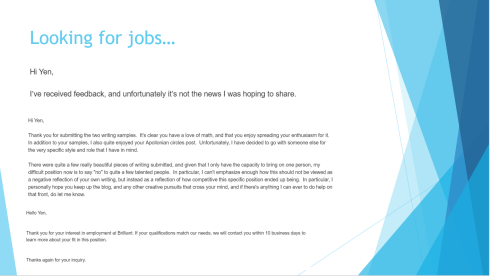I wrote this post from a plane on my way back from Chicago last weekend. Maybe I’ll do one for each city I’ve lived in [Orange County, California, Santa Barbara (2010-2012), New Haven (2006-2010), Austin (2014-2016)] eventually. A friend asked me to write a blog post of recommendations that I have from my time in the city. Okay! Let’s do this!
I cried a little bit when I landed and entered the city that I love so much, but I had a great weekend there and am ready to go home and see my family. But if the opportunity came up for us to move to Chicago somehow, it would be a very serious conversation because we do love that city. I bolded my favorite favorites.
Chicago recommendations
To get around: Download the Transit app. It works in very many cities, and it works very well.
To do: the Art Institute is truly incredible. Don’t miss the weird tiny miniature rooms and the fantastic paperweights downstairs right after the entrance. The stained glass mirrors in the very back are also easy to miss and wonderful.
I loved the Museum of Science and Industry this trip. I’d been once before but it was incredible this time. Loved the mirror maze and the science of Pixar exhibit, and the Swiss ball toy, and the model trains… It’s great.
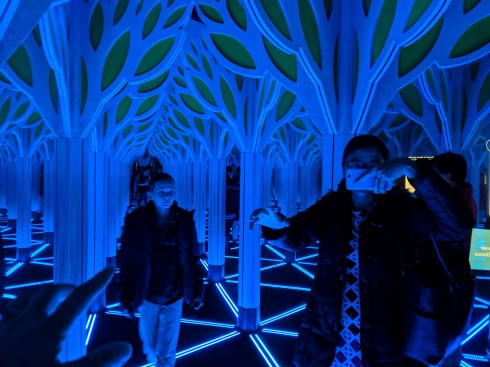
I had to TRI different ANGLES to get a good picture of the mirror maze.
The Chicago architecture boat tours are just as great as everyone says they are. I had a great time on my Arrr-chitecture pirate ship tour also.
If you’re there in the fall, Open House Chicago is an incredible opportunity- the architecture foundation opens up scores of buildings and rooftops and areas not usually available to the public, and you can just walk around and learn all about the architecture of all of these incredible hidden gems.
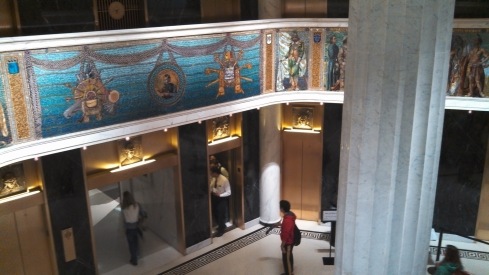
Hey I just met you, and this is crazy, but here’s Chicago, so Call ’em maybe
If you live there, consider a neighborhood walking tour– there’s like 80 available. We walked around our neighborhood and learned so much.
The Logan Square farmer’s market is great. The Wicker Park one, not so much. Of all the festivals and fairs, I like the Renegade Craft Fair the best (yearly). Picnics in Millenium Park with music are the best. Lincoln Park Zoo is fantastic and free.
Maybe not tourist attractions to anyone but me:
Mariano’s is my favorite grocery store because of its 99 cent orange juice, free juicing of produce, free steaming and grilling of seafood or meat, live music, and especially the wine and oyster bars. Hot tip: the one on South Clark does NOT have a wine nor oyster bar! What even is the point of a Mariano’s without excessively luxurious extras? Oh yeah, groceries…
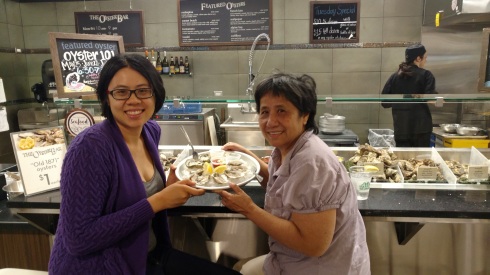
My mom and I on a visit to Chicago. Oy. Sturdy snacks!
The Walgreen’s at Damen, North and Milwaukee is inside an old bank and has a really cool ceiling and old-timey pharmacy stuff on display in the Vitamin Vault.
To eat (obviously the important thing):
Chinatown: MingHin is the best dimsum in the city and also very cheap. I like Joy Yee bubble tee and Chi Cafe for food, especially anything in XO sauce.
South of UIC (I didn’t go down here much):
Pleasant House Pub was the place I went to straight from the airport. Wonderful savory pies, around $10 a pie, and delicious. I went here when it was just a bakery and now it looks popular and good for brunch too.

Hot tip: take a cold pie home! On a plane for hours!

A bit of a pie-ty that I overbaked them and they leaked…
Lotus Banh Mi: surprisingly great banh mi shop that I ate at very often, a ten minute walk from the department. Also in the $ range.
The Rosebud: More of a $$$ range, but this old-fashioned Italian place is great, over near the UIC hospital. I’m not usually into Italian food, but this was very well done and quite flavorful- really richly flavored sauces that weren’t too heavy.
The Loop:
The Gage: $$$ classy fancy New American food right on Michigan Ave, we went here a few times before going to shows downtown. The beet salad was great, as was all their seafood dishes.
Pierogi Heaven: $ I LOVED this place. Tiny shop with hot trays on Wells Street, I think across from an adult store and next to a Subway or something. Incredible pierogies, stuffed cabbage, just general deliciousness. I went here anytime I was in the north part of the Loop.
Various neighborhoods:
Andy’s Thai Kitchen: $$ the papaya salad here was SO SPICY and so good. All the food was great and also VERY SPICY. First place I had kao soy, now one of my favorite Thai dishes- a chicken coconut curry stew with yellow egg noodles, and topped with crispy egg noodles. In Lakeview.
Isla Filipino food: I LOVED this filipino restaurant. I also love Filipino food. Just super flavorful, super delicious, BYOB and reasonably priced. I have a distinct memory of coming here with 8-10 people with a lot of beer and getting a lot of food.
Cafe Ba-ba-reeba is fancier and slightly more expensive tapas, Cafe Iberico is a ridiculous large restaurant also with great tapas. We loved both.
Chicago Diner: this vegetarian haven has been around since the 80s so you know it’s good. The Reuben is incredible. Also their vegan milkshakes are surprisingly excellent.
Yolk: great brunch.
Kasia’s: a Polish deli/restaurant/grocery store that makes the pierogies in the freezer. But their pierogies are really good!
Green Zebra: if you have a vegetarian (or is it vegan), this is THE fancy restaurant to take them. The mushroom pate was so good.
Wicker Park:
Tamale Spaceship $: hipster tamales that we loved.
Dove’s Luncheonette: one of my favorite places, a great grasp on flavors with Mex/Tex-Mex takes on brunch-y foods. The brisket taco norteno and the pepper-potato hash were the only things that had stayed on the menu in the four years since I’d been there, and they are both still great. I loved a quinoa pancake there, a sandwich that was soaked in ridiculously spicy mole sauce, a light avocado-seafood cocktail, their avocado toast was perfect… I love this place a lot. Very strong tequila cocktails.
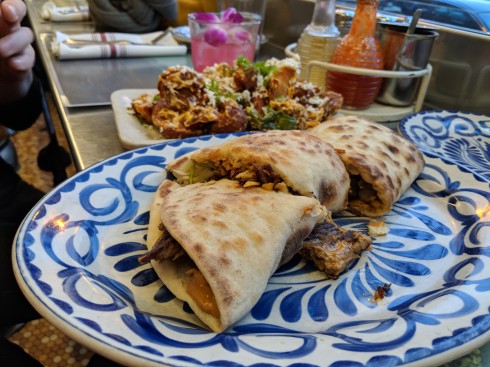
Service is brisk. Catch a waiter if you can! [But actually service is fine I just needed to get ‘brisket’ into a sentence.]
Stan’s Donuts: the banana biscoff pocket and the pistachio old fashioned are very good donuts in a town full of very good donuts. If someone recommends a donut shop to you it’s probably great.
Enso sushi: a small place with creative, yummy sushi rolls. I regularly got off the blue line from O’Hare and went straight here.
Coast sushi: extremely good, more expensive sushi up the street. Loud but really, really good. Not as creative perhaps as Enso, and definitely not as everyday.
Mindy’s Hot Chocolate: the hot chocolate really is good. Also they have food.
1311 Empanadas: $ embarassingly often did we come here, but we lived across the street. Cheap-ish, filling, yummy empanadas!
Sultan’s: I’m not sure how long this has been here, but Sultan’s feels like an institution. Fantastic $5 falafel sandwiches, a small cold bar, just great.
En Hakkore. This Korean place only has like 4 dishes and sashimi bibimbap is one of them. I loved it.
Antique Taco: I thought the tacos here were sort of meh but everything else is incredible. Horchata drink (it was a cocktail or a milkshake) was awesome. The soups are very, very, very good.
Podhalanka: this is a very hole in the wall place that is hard to find but legit Polish food. You will be upsold and you will eat yummy, salty Polish food.
Publican Anker: I just tried this place for the rehearsal dinner of the wedding I went to and it was great. An offshoot from the Publican.
Bongo Room still draws huge lines for brunch, go super early or on a weekday for their wonderful pancakes, huge salads. People love their breakfast burrito and I think those people are wrong.
Logan Square:
Lula Cafe is truly great but also I hate waiting so go at 9:30 in the morning?
Longman & Eagle: one of my favorite restaurants in the city. Wonderful cocktails (I love savory, herby, or spicy cocktails and they hit them all), great food. The first time my husband had bone marrow was here! They do it with a bacon jam on top. The wild bison burger is great. I did not love the cauliflower-lentil dish that is always on the menu but a lot of people do. I really, really like this place and almost all their food. They also used to and probably still do interesting pop-ups in the back- once it was donuts, another time it was sausages. Those were all great.
Fancy Pants Food Places $$$$:
-Yes, I’ve been to Alinea and yes it is a once-in-a-lifetime event. It’s perfect. The food is perfect. I don’t usually think about service but I was so, so impressed with it: jokey and teasing and lighthearted and self-deprecating with me and spouse, then immediately polished, white-glove, yes sir/maam with the table next to us.
Next: Also a yes. I mean, if you’re paying this much to go to these places you have already looked up reviews and do not need me to tell you these things…. except…
Avec: Not impressed! Slow, distracted service, not-very-memorable food for way too high a price point.
Mexique: this was fine?
Le Colonial: My least-favorite dining experience in the city. I mean, the concept is weird- let’s go back to colonial times in Vietnam when France was occupying it? I tried to order in Vietnamese and my white waitress did not know what I was saying. Why would you put Vietnamese names on your menu if you can’t understand them?
To drink:
Ipsento is one of the best coffeeshops in the country. (I don’t drink coffee but spouse is very into it).
Wormhole (Wicker Park) has a DeLorean, always has cascara, roasts HalfWit coffee, and has a dear place in my heart. Super interesting fun drinks and very hipster, great for working.
Alliance Bakery (on Division, so the bottom of Wicker Park/Ukrainian Village) was a place i worked often, even though it was cold. We got our wedding cake there!
I loved Maria’s (featured in the nytimes a few times) back when Pleasant House was next to it. Now they have Korean food?! The Zombiemaker beer cocktail had Gumball Head from Three Floyds (one of my favorite beers) mixed with grapefruit juice and maybe vodka and it was my favorite beer cocktail ever. Also my only beer cocktail.
People were always hyping Violet Hour for their $15 cocktails but like, they’re really good but not like, wait in line good.
Many places I loved in Chicago are now closed, and of course there’s now a zillion more restaurants and bars and things to do etc. But these were some of my favorites. You can also look at my yelp for reviews etc.
